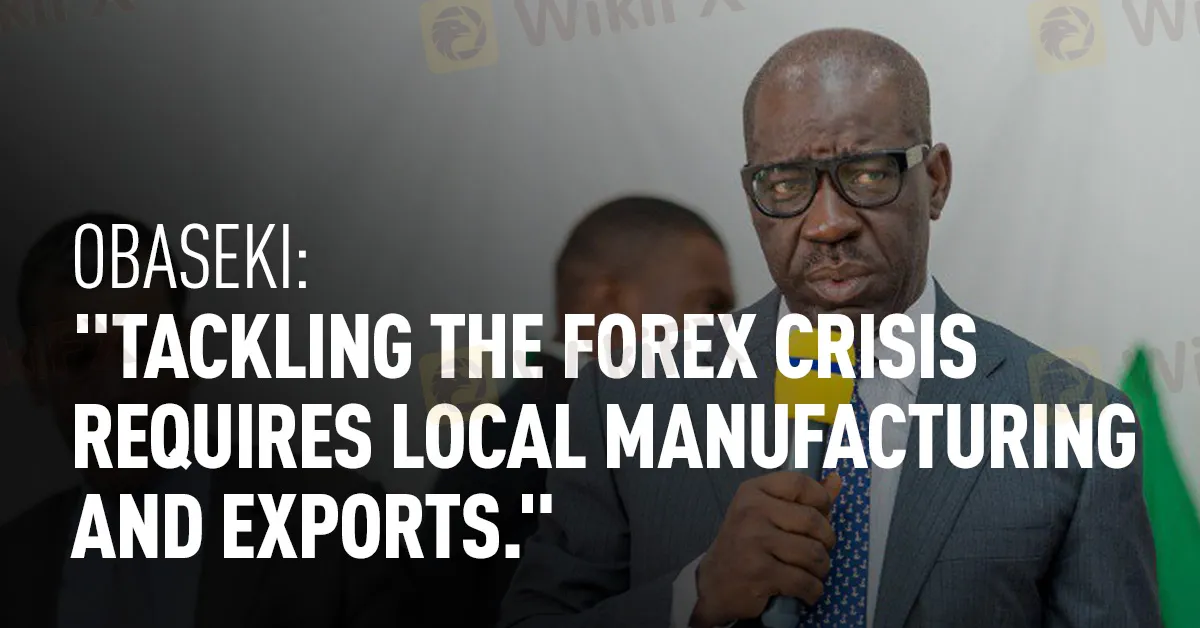简体中文
繁體中文
English
Pусский
日本語
ภาษาไทย
Tiếng Việt
Bahasa Indonesia
Español
हिन्दी
Filippiiniläinen
Français
Deutsch
Português
Türkçe
한국어
العربية
OBASEKI: "TACKLING THE FOREX CRISIS REQUIRES LOCAL MANUFACTURING AND EXPORTS."
Abstract:The foreign exchange market, often known as the currency market, is a worldwide decentralized over-the-counter (OTC) market where currencies are traded. The foreign exchange rates for each currency are set by this market.

The foreign exchange market, often known as the currency market, is a worldwide decentralized over-the-counter (OTC) market where currencies are traded. The foreign exchange rates for each currency are set by this market. It covers every facet of purchasing, selling, and converting currencies at established or current rates. It is by far the biggest market in the world in terms of trade volume, with the credit market coming in second. The bigger international banks are the primary players in this industry. With the exception of weekends, financial hubs all over the world serve as anchors for trading between a variety of different types of buyers and sellers.
According to Godwin Obaseki, the governor of Edo State, the federal government may address the current foreign exchange problem by implementing fiscal policies that incentivize manufacturers to increase local output and obtain loans in order to increase exports of goods created in Nigeria.
This was said by Obaseki on Tuesday during a courtesy visit to Government House in Benin City with Francis Meshioye, the National President of the Manufacturers' Association of Nigeria, and other executives.
The governor stated that the manufacturers' association was essential to the survival of the country's economy and pointed out that Edo State is using its distinct advantage—the availability of raw resources for manufacturing and production—to propel economic growth.
“Nigeria has continued to rely on imported goods and services that they do not produce over the last 40 years,” he stated. We no longer have foreign exchange, so we are now forced to consume the goods that we produce domestically. As a country, we don't export any produced items, but MAN can help by focusing the economy on manufacturing.
“We must foster an atmosphere that will allow the association to flourish and abandon the ideas that the government should not compete with the private sector or those who provide services to us, as this influences government policy and the government views these individuals as criminals while viewing those who inflate the budget as nationalists.”
Speaking about the State's efforts to increase production, Obaseki stated, “We have created encouraging policies for people who want to go into timber plantations and have come out with strong environmental policies to re-grow the forest and wood industry, ensuring that forest guards are re-introduced to police the forest and stop illegal logging.”
The governor stated, “The State through the ESOPP Program gave seven investors 70,000 hectares of land to grow oil palm,” highlighting the fact that Edo State has the largest oil palm development program in Africa.
In Edo State, we anticipated this for a long time and responded with courage. One of the main actions we took was to restructure our educational system, especially the foundational education, to make sure that the next generation of residents is well-educated. We envision Nigeria providing the highest caliber labor in the coming decades.
The governor of Edo has made significant economic progress, positioning the state as a top investment destination for the private sector, according to the National President of the Manufacturing Association of Nigeria.
Since the Midwest is a center for industrial activity, working with the government to implement policies and programs that would accelerate industrial growth is essential to reviving Edo State's manufacturing sector.
“We are happy about the progress in promoting the influx of investments in Edo through the yearly Alaghodaro, which has given rise to a number of manufacturing partnerships between the public and private sectors, including the Duport Refinery, Green Hill Ethanol Plant, Ossiomo Power, and Edo Production hub.”

Disclaimer:
The views in this article only represent the author's personal views, and do not constitute investment advice on this platform. This platform does not guarantee the accuracy, completeness and timeliness of the information in the article, and will not be liable for any loss caused by the use of or reliance on the information in the article.
Read more

March Oil Production Declines: How Is the Market Reacting?
Oil production cuts in March are reshaping the market. Traders are closely watching OPEC+ decisions and supply disruptions, which could impact prices and future production strategies.

How to Calculate Leverage and Margin in the Forex Market
Leverage amplifies both potential profits and risks. Understanding how to calculate leverage and margin helps traders manage risks and avoid forced liquidation.

USD/INR, USD/PHP Forecast April 2025
The global forex markets are bracing for April 2025 with divergent forecasts for key emerging market pairs. In particular, the USD/INR and USD/PHP pairs have attracted significant attention amid a mix of central bank interventions, evolving U.S. policy signals, and regional economic shifts. In this article, we review multiple forecasts, examine the driving factors, and outline what traders might expect as the month unfolds.

April Forex Trends: EUR/USD, GBP/USD, USD/JPY, AUD/USD, USD/CAD Insights
Know April’s forex seasonality trends for EUR/USD, GBP/USD, USD/JPY, AUD/USD, and USD/CAD. Historical insights and key levels to watch in 2025.
WikiFX Broker
Latest News
Exposing the Top 5 Scam Brokers of March 2025: A Closer Look by WikiFX
Gold Prices Climb Again – Have Investors Seized the Opportunity?
Webull Launches SMSF Investment Platform with Zero Fees
Australian Regulator Warns of Money Laundering and Fraud Risks in Crypto ATMs
The Withdrawal Trap: How Scam Brokers Lure Victims into Paying More
FCA to Investors: Think Twice Before Trusting These Brokers
Trump\s tariffs: How could they affect the UK and your money
Trump gambles it all on global tariffs he\s wanted for decades
HTFX Spreads Joy During Eid Charity Event in Jakarta
How Will the Market React at a Crucial Turning Point?
Currency Calculator







